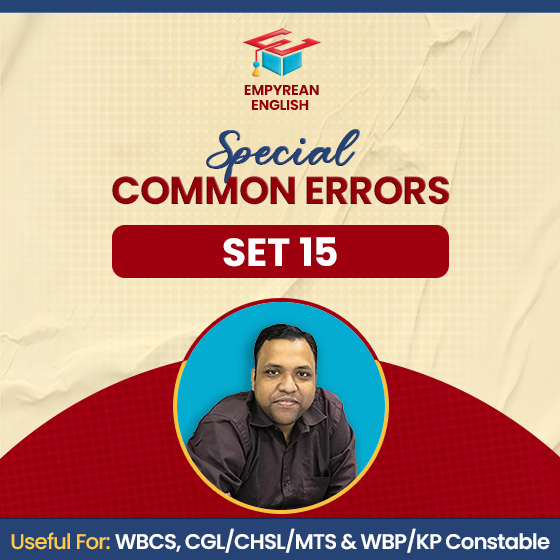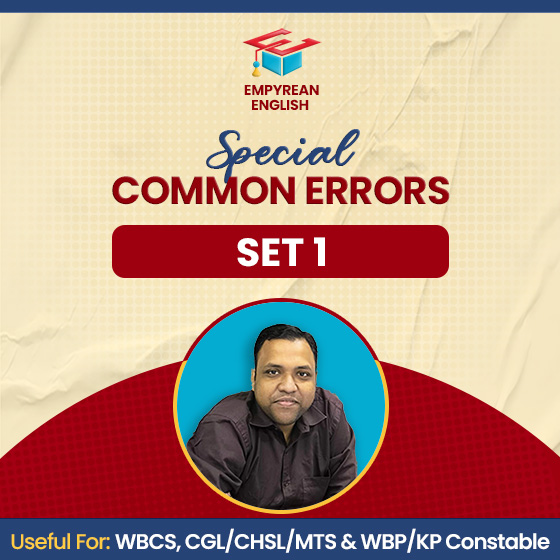আমরা আপনাদের জন্য এনেছি Special Common Errors – এর সেট, যা বিভিন্ন প্রতিযোগিতামূলক পরীক্ষার প্রস্তুতিতে অত্যন্ত কার্যকর। প্রতিটি প্রশ্নের শেষে সঠিক উত্তর এবং সমাধান দেওয়া থাকবে। নিয়মিত এমন কন্টেন্ট পেতে আমাদের সাথে যুক্ত থাকুন এবং আপনার প্রস্তুতিকে আরো মজবুত করুন। 🎯
Q.1. India’s ambitions for a $5-trillion economy and beyond will (a)/ require a willingness to remove the post-colonial impulses (b)/ of a nanny State and enter in an era of collaborative regulation. (c)/ No Error (d)
Ans. c
Sol. We don’t need to use the preposition ‘in’ or ‘into’ after the verb ‘enter’. However, we can use these prepositions (in/into) after the noun ‘entry’.
(Note: ‘Enter into something’ = to start to become involved in something, especially a discussion or agreement
Ex- They refuse to enter into any discussion on this matter.)
Q.2. Ignoring the children’s learning (a)/ stages, the schools have (b)/ distort the curriculum. (c)/ No Error (d)
Ans. c
Sol. Use ‘distorted’ – in place of – ‘distort’. After the helping verb ‘have’, past participle (v3) is used.
Q.3. Azerbaijan’s windy capital Baku, has numerous tricks (a)/ up its sleeve to keep you divert, right from eternal flame (b)/ to a bustling lit-up promenade. (c)/ No Error (d)
Ans. b
Sol. Use the indefinite article ‘an’ before the adjective ‘eternal’ for the noun ‘flame’.
Q.4. The strings of the veena (A)/ practically mimics (b)/ the human voice. (c)/ No Error (d)
Ans. b
Sol. Use ‘mimic’ – in place of – ‘mimics’. The subject of the given sentence is ‘the strings’, which is plural in nature, so, the plural form ‘mimic’ should be used here instead of the singular form ‘mimics’.
Q.5. A self-taught artist, inspired by impressionists (a)/ Vincent Van Gogh and Rousseau, Anita Saran hold her first solo (b)/ show in 1999 in Bengaluru. (c)/ No Error (d)
Ans. b
Sol. Use ‘held’ – in place of – ‘hold’. The sentence is framed in the past tense, so, the past form ‘held’ should be used here.
Q.6. One of the world’s biggest economies, China, (a)/ came to halt when (b)/ the coronavirus was detected. (c)/ No Error (d)
Ans. b
Sol. Use the indefinite article ‘a’ before the noun ‘halt’.
Halt (n/v) = a suspension of movement or activity, typically a temporary one
Ex- The bus came to a halt (= stopped) just in time to avoid hitting the wall.
Q.7. Since the coronavirus is believed to have originated (a)/ by a wildlife food market, the authorities (b)/ banned consumption of wildlife meat. (c)/ No Error (d)
Ans. b
Sol. Use the preposition ‘from’ – in place of – ‘by’. Preposition ‘from’ is used for ‘origin’.
Q.8. The Amazon fires and Australian bushfires (a)/ are symptomatic of (b)/ our inertia on climate. (c)/ No Error (d)
Ans. d
Sol. No error
Q.9. The world’s number two and three oil producers are going to war (a)/ at each other over how to tackle the number (b)/ one oil producer, the United States. (c)/ No Error (d)
Ans. b
Sol. Use ‘with’ – in place of – ‘at’. The correct formation is ‘with each other’. The sentence talks about oil producers going to war with each other.
Q.10. If this game of hydrocarbon chicken (a)/ plays through the year, (b)/ India would count its blessings. (c)/ No Error (d)
Ans. c
Sol. Use ‘will’ – in place of – ‘would’. The sentence is framed in the conditional way. It talks about the possible condition of the present time and the probable outcome of the future. So, the verb ‘will’ should be used here instead of ‘would’.
Q.11. Facial recognition can be of constructive use (a)/ in numerous field, but it is fallible and must be (b)/ regulated to guard against its potential misuse. (c)/ No Error (d)
Ans. b
Sol. Use ‘fields’ – in place of – ‘field’. Plural noun is used with ‘numerous and several’.
Q.12. Across the world, people (a)/ are increasingly opting (b)/ out of relationships. (c)/ No Error (d)
Ans. d
Sol. No error
Q.13. At a time when humour is largely (a)/ absent of public discourse, the festival places it right (b)/ at the centre — fair and square. (c)/ No Error (d)
Ans. b
Sol. Use ‘absent from’ – in place of – ‘absent of’. When the word ‘absent’ is used as a verb and adjective, preposition ‘from’ is used with it.
Ex- Anna’s been absent from work for four days with flu. (Absent = adjective)
Ex- You cannot choose to absent yourself (from work/school) on a whim. (Absent = verb)
Q.14. Living in a cramped room on the outskirts of Delhi, (a)/ the contractual labour for Anjani (b)/ is likely a family inheritance. (c)/ No Error (d)
Ans. c
Sol. Use ‘like’ – in place of – ‘likely’. The word ‘likely’ is both an adjective and adverb. ‘Like’ means similar to; in the same way or manner as.
Ex- She sings like an angel!
As an adjective, ‘likely’ means such as well might happen or be true; probable; apparently suitable; promising. As an adverb, ‘likely’ means probably.
Ex- What’s the likely outcome of this whole business?
Q.15. Irrespective of the recently price trends, the Centre (a)/ should persist with measures to reduce the country’s (b)/ oil dependency over the long run. (c)/ No Error (d)
Ans. a
Sol. Use ‘recent’ – in place of – ‘recently’. Before the noun ‘price trends’, we need the adjective ‘recent’ instead of the adverb ‘recently’.
Ex- Is that a recent photo? (Recent = adjective)
Ex- I recently bought a TV. (Recently = adverb)
Q.16. State Bank of India (SBI), the bellwether and archetypal (a)/ public sector bank (PSB), have abolished the minimum balance (b)/ requirement on savings bank accounts. (c)/ No Error (d)
Ans. b
Sol. Use the helping verb ‘has’ – in place of – ‘have’. The subject is here State Bank of India, which is singular in nature, so, the singular verb form ‘has’ should be used here instead of the plural form ‘have’.
(Note: ‘the bellwether and archetypal public sector bank’ is used here for ‘State Bank of India’.)
Q.17. With the death of a 76-year-old man in Karnataka, (a)/ India lost its first citizen in (b)/ the coronavirus (Covid-19) on Thursday. (c)/ No Error (d)
Ans. b
Sol. Use the preposition ‘to’ – in place of – ‘in’. ‘Lost to’ is a fixed use.
Q.18. All companies, which can have employees work (a)/ into home, must begin (b)/ doing so immediately. (c)/ No Error (d)
Ans. b
Sol. Use the preposition ‘from’ – in place of – ‘into’. ‘Work from home’ is the correct phrase.
Q.19. If we are to move toward (a)/ a digital, less-cash economy, (b)/ we must make ATMs scarcely. (c)/ No Error (d)
Ans. c
Sol. Use ‘scarce’ – in place of – ‘scarcely’. Since, “make + object + adjective” is the correct formation. So, we have to use the adjective ‘scarce’ in place of the adverb ‘scarcely’.
Q.20. If a weed has (a)/ to be destroyed, it is removed (b)/ at the roots. (c)/ No Error (d)
Ans. c
Sol. Use ‘by the roots’ – in place of – ‘at the roots’. The correct formation is ‘to weed something out by the (its) roots’. There is also a word ‘extirpate’ which originally means ‘to weed out by the roots’. We can use it more broadly to describe getting rid of something completely. Use the verb ‘extirpate’ when you mean to destroy completely or get rid of completely.
আমাদের Objective এবং Descriptive English-এর পেইড ব্যাচে ভর্তি হতে নিচের ফর্মটি পূরণ করুন:


